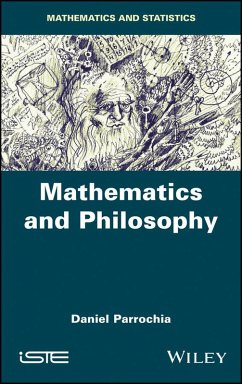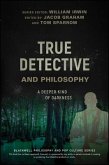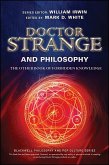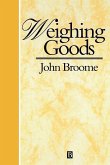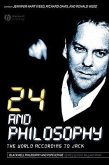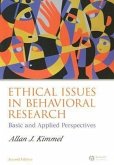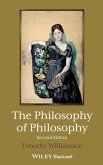Daniel Parrochia
Mathematics and Philosophy
Daniel Parrochia
Mathematics and Philosophy
- Gebundenes Buch
- Merkliste
- Auf die Merkliste
- Bewerten Bewerten
- Teilen
- Produkt teilen
- Produkterinnerung
- Produkterinnerung
This book, which studies the links between mathematics and philosophy, highlights a reversal. Initially, the (Greek) philosophers were also mathematicians (geometers). Their vision of the world stemmed from their research in this field (rational and irrational numbers, problem of duplicating the cube, trisection of the angle...). Subsequently, mathematicians freed themselves from philosophy (with Analysis, differential Calculus, Algebra, Topology, etc.), but their researches continued to inspire philosophers (Descartes, Leibniz, Hegel, Husserl, etc.). However, from a certain level of…mehr
Andere Kunden interessierten sich auch für
![True Detective and Philosophy True Detective and Philosophy]() True Detective and Philosophy17,99 €
True Detective and Philosophy17,99 €![Doctor Strange and Philosophy Doctor Strange and Philosophy]() Doctor Strange and Philosophy17,99 €
Doctor Strange and Philosophy17,99 €![Weighing Goods Weighing Goods]() John BroomeWeighing Goods71,99 €
John BroomeWeighing Goods71,99 €![24 and Philosophy 24 and Philosophy]() Jennifer Hart Weed / Richard Davis / Ronald Weed24 and Philosophy26,99 €
Jennifer Hart Weed / Richard Davis / Ronald Weed24 and Philosophy26,99 €![Ethical Issues in Behavioral Research Ethical Issues in Behavioral Research]() Allan J KimmelEthical Issues in Behavioral Research96,99 €
Allan J KimmelEthical Issues in Behavioral Research96,99 €![Critical Philosophy of Innovation and the Innovator Critical Philosophy of Innovation and the Innovator]() Xavier PavieCritical Philosophy of Innovation and the Innovator186,99 €
Xavier PavieCritical Philosophy of Innovation and the Innovator186,99 €![The Philosophy of Philosophy The Philosophy of Philosophy]() Timothy WilliamsonThe Philosophy of Philosophy91,99 €
Timothy WilliamsonThe Philosophy of Philosophy91,99 €-
-
-
This book, which studies the links between mathematics and philosophy, highlights a reversal. Initially, the (Greek) philosophers were also mathematicians (geometers). Their vision of the world stemmed from their research in this field (rational and irrational numbers, problem of duplicating the cube, trisection of the angle...). Subsequently, mathematicians freed themselves from philosophy (with Analysis, differential Calculus, Algebra, Topology, etc.), but their researches continued to inspire philosophers (Descartes, Leibniz, Hegel, Husserl, etc.). However, from a certain level of complexity, the mathematicians themselves became philosophers (a movement that begins with Wronsky and Clifford, and continues until Grothendieck).
Hinweis: Dieser Artikel kann nur an eine deutsche Lieferadresse ausgeliefert werden.
Hinweis: Dieser Artikel kann nur an eine deutsche Lieferadresse ausgeliefert werden.
Produktdetails
- Produktdetails
- Verlag: Wiley
- Seitenzahl: 352
- Erscheinungstermin: 24. Juli 2018
- Englisch
- Abmessung: 239mm x 157mm x 23mm
- Gewicht: 680g
- ISBN-13: 9781786302090
- ISBN-10: 1786302098
- Artikelnr.: 50010644
- Herstellerkennzeichnung
- Libri GmbH
- Europaallee 1
- 36244 Bad Hersfeld
- gpsr@libri.de
- Verlag: Wiley
- Seitenzahl: 352
- Erscheinungstermin: 24. Juli 2018
- Englisch
- Abmessung: 239mm x 157mm x 23mm
- Gewicht: 680g
- ISBN-13: 9781786302090
- ISBN-10: 1786302098
- Artikelnr.: 50010644
- Herstellerkennzeichnung
- Libri GmbH
- Europaallee 1
- 36244 Bad Hersfeld
- gpsr@libri.de
Parrochia Daniel, Université Jean Moulin, Lyon.
Introduction xi Part 1. The Contribution of Mathematician-Philosophers 1 Introduction to Part 1 3 Chapter 1. Irrational Quantities 7 1.1. The appearance of irrationals or the end of the Pythagorean dream 8 1.2. The first philosophical impact 9 1.3. Consequences of the discovery of irrationals 11 1.3.1. The end of the eternal return 11 1.3.2. Abandoning the golden ratio 11 1.3.3. The problem of di3.1sorder in medicine, morals and politics 12 1.4. Possible solutions 12 1.5. A famous example: the golden number 14 1.6. Plato and the dichotomic processes 16 1.7. The Platonic generalization of ancient Pythagoreanism 17 1.7.1. The Divided Line analogy 17 1.7.2. The algebraic interpretation 18 1.7.2.1. Impossibilities 19 1.7.2.2. The case where k = Ø 19 1.8. Epistemological consequences: the evolution of reason 20 Chapter 2. All About the Doubling of the Cube 23 2.1. History of the question of doubling a cube 24 2.2. The non-rationality of the solution 24 2.2.1. Demonstration 24 2.2.2. The diagonal is not a solution 25 2.3. The theory proposed by Hippocrates of Chios 25 2.4. A philosophical application: platonic cosmology 27 2.5. The problem and its solutions 29 2.5.1. The future of the problem 29 2.5.2. Some solutions proposed by authors of the classical age 30 2.5.2.1. Mechanical solutions 30 2.5.2.2. Analytical solution 31 2.5.3. The doubling of the cube - going beyond Archytas: the evolution of mathematical methods 36 2.5.3.1. Menaechmus' solution 37 2.5.3.2. A brief overview of the other solutions 39 2.6. The trisection of an angle 40 2.6.1. Bold mathematicians 40 2.6.2. Plato, the tripartition of the soul and self-propulsion 42 2.6.3. A very essential shell 44 2.6.4. A final excercus 46 2.7. Impossible problems and badly formulated problems 46 2.8. The modern demonstration 47 Chapter 3. Quadratures, Trigonometry and Transcendance 51 3.1.
- the mysterious number 52 3.2. The error of the "squarers" 53 3.3. The explicit computation of
55 3.4. Trigonometric considerations 57 3.5. The paradoxical philosophy of Nicholas of Cusa 59 3.5.1. An attempt at computing an approximate value for
59 3.5.2. Philosophical extension 61 3.6. What came next and the conclusion to the history of
63 3.6.1. The age of infinite products 64 3.6.2. Machin's algorithm 64 3.6.3. The problem of the nature of
65 3.6.4. Numerical and philosophical transcendance: Kant, Lambert and Legendre 66 Part 2. Mathematics Becomes More Powerful 69 Introduction to Part 2 71 Chapter 4. Exploring Mathesis in the 17th Century 75 4.1. The innovations of Cartesian mathematics 76 4.2. The "plan" for Descartes' Geometry 79 4.3. Studying the classification of curves 79 4.3.1. Possible explanations for the mistakes made by the Ancients 81 4.3.2. Conditions for the admissibility of curves in geometry 83 4.4. Legitimate constructions 85 4.5. Scientific consequences of Cartesian definitions 87 4.6. Metaphysical consequences of Cartesian mathematics 88 Chapter 5. The Question of Infinitesimals 91 5.1. Antiquity - the prehistory of the infinite 92 5.1.1. Infinity as Anaximander saw it 92 5.1.2. The problem of irrationals and Zeno's paradoxes 93 5.1.3. Aristotle and the dual nature of the Infinite 96 5.2. The birth of the infinitesimal calculus 98 5.2.1. Newton's Writings 99 5.2.2. Leibniz's contribution 101 5.2.3. The impact of calculus on Leibnizian philosophy 105 5.2.3.1. Small perceptions and differentials 105 5.2.3.2. Matter and living beings 109 5.2.3.3. The image of order 110 5.2.4. The epistemological problem 117 Chapter 6. Complexes, Logarithms and Exponentials 121 6.1. The road to complex numbers 122 6.2. Logarithms and exponentials 125 6.3. De Moivre's and Euler's formulas 128 6.4. Consequences on Hegelian philosophy 130 6.5. Euler's formula 132 6.6. Euler, Diderot and the existence of God 133 6.7. The approximation of functions 134 6.7.1. Taylor's formula 135 6.7.2. MacLaurin's formula 135 6.8. Wronski's philosophy and mathematics 137 6.8.1. The Supreme Law of Mathematics 138 6.8.2. Philosophical interpretation 142 6.9. Historical positivism and spiritual metaphysics 143 6.9.1. Comte's vision of mathematics 143 6.9.2. Renouvier's reaction 146 6.9.3. Spiritualist derivatives 147 6.10. The physical interest of complex numbers 148 6.11. Consequences on Bergsonian philosophy 150 Part 3. Significant Advances 155 Introduction to Part 3 157 Chapter 7. Chance, Probability and Metaphysics 161 7.1. Calculating probability: a brief history 162 7.2. Pascal's "wager" 166 7.2.1. The Pensées passage 166 7.2.2. The formal translation 167 7.2.3. Criticism and commentary 167 7.2.3.1. Laplace's criticism 167 7.2.3.2. Emile Borel's observation 169 7.2.3.3. Decision theory 170 7.2.3.4. The non-standard analysis framework 171 7.3. Social applications, from Condorcet to Musil 172 7.4. Chance, coincidences and omniscience 174 Chapter 8. The Geometric Revolution 179 8.1. The limits of the Euclidean demonstrative ideal 180 8.2. Contesting Euclidean geometry 183 8.3. Bolyai's and Lobatchevsky geometries 184 8.4. Riemann's elliptical geometry 191 8.5. Bachelard and the philosophy of "non" 194 8.6. The unification of Geometry by Beltrami and Klein 196 8.7. Hilbert's axiomatization 198 8.8. The reception of non-Euclidean geometries 200 8.9. A distant impact: Finsler's philosophy 200 Chapter 9. Fundamental Sets and Structures 203 9.1. Controversies surrounding the infinitely large 203 9.2. The concept of "the power of a set" 207 9.2.1. The "countable" and the "continuous" 208 9.2.2. The uniqueness of the continuum 209 9.2.3. Continuum hypothesis and generalized continuum hypothesis . . . 212 9.3. The development of set theory 213 9.4. The epistemological route and others 218 9.5. Analytical philosophy and its masters 222 9.6. Husserl with Gödel? 225 9.7. Appendix: Gödel's ontological proof 226 Part 4. The Advent of Mathematician-Philosophers 229 Introduction to Part 4 231 Chapter 10. The Rise of Algebra 233 10.1. Boolean algebra and its consequences 234 10.2. The birth of general algebra 237 10.3. Group theory 238 10.4. Linear algebra and non-commutative algebra 241 10.5. Clifford: a philosopher-mathematician 245 Chapter 11. Topology and Differential Geometry 253 11.1. Topology 253 11.1.1. Continuity and neighborhood 254 11.1.2. Fundamental definitions and theorems 255 11.1.3. Properties of topological spaces 257 11.1.4. Philosophy of classifications versus topology of the being 261 11.2. Models of differential geometry 262 11.2.1. Space as a support to thought 262 11.2.2. The general concept of manifold 263 11.2.3. The formal concept of differential manifold 264 11.2.4. The general theory of differential manifold 265 11.2.5. G-structures and connections 266 11.3. Some philosophical consequences 268 11.3.1. Whitehead's philosophy and relativity 269 11.3.2. Lautman's singular work 270 11.3.3. Thom and the catastrophe theory 273 Chapter 12. Mathematical Research and Philosophy 279 12.1. The different domains 279 12.2. The development of classical mathematics 282 12.3. Number theory and algebra 282 12.4. Geometry and algebraic topology 284 12.5. Category and sheaves: tools that help in globalization 286 12.5.1. Category theory 286 12.5.2. The Sheaf theory 292 12.5.3. Link to philosophy 294 12.5.4. Philosophical impact 295 12.6. Grothendieck's unitary vision 295 12.6.1. Schemes 295 12.6.2. Topoi 296 12.6.3. Motives 298 12.6.4. Philosophical consequences of motives 301 Conclusion 305 Bibliography 311 Index 327
- the mysterious number 52 3.2. The error of the "squarers" 53 3.3. The explicit computation of
55 3.4. Trigonometric considerations 57 3.5. The paradoxical philosophy of Nicholas of Cusa 59 3.5.1. An attempt at computing an approximate value for
59 3.5.2. Philosophical extension 61 3.6. What came next and the conclusion to the history of
63 3.6.1. The age of infinite products 64 3.6.2. Machin's algorithm 64 3.6.3. The problem of the nature of
65 3.6.4. Numerical and philosophical transcendance: Kant, Lambert and Legendre 66 Part 2. Mathematics Becomes More Powerful 69 Introduction to Part 2 71 Chapter 4. Exploring Mathesis in the 17th Century 75 4.1. The innovations of Cartesian mathematics 76 4.2. The "plan" for Descartes' Geometry 79 4.3. Studying the classification of curves 79 4.3.1. Possible explanations for the mistakes made by the Ancients 81 4.3.2. Conditions for the admissibility of curves in geometry 83 4.4. Legitimate constructions 85 4.5. Scientific consequences of Cartesian definitions 87 4.6. Metaphysical consequences of Cartesian mathematics 88 Chapter 5. The Question of Infinitesimals 91 5.1. Antiquity - the prehistory of the infinite 92 5.1.1. Infinity as Anaximander saw it 92 5.1.2. The problem of irrationals and Zeno's paradoxes 93 5.1.3. Aristotle and the dual nature of the Infinite 96 5.2. The birth of the infinitesimal calculus 98 5.2.1. Newton's Writings 99 5.2.2. Leibniz's contribution 101 5.2.3. The impact of calculus on Leibnizian philosophy 105 5.2.3.1. Small perceptions and differentials 105 5.2.3.2. Matter and living beings 109 5.2.3.3. The image of order 110 5.2.4. The epistemological problem 117 Chapter 6. Complexes, Logarithms and Exponentials 121 6.1. The road to complex numbers 122 6.2. Logarithms and exponentials 125 6.3. De Moivre's and Euler's formulas 128 6.4. Consequences on Hegelian philosophy 130 6.5. Euler's formula 132 6.6. Euler, Diderot and the existence of God 133 6.7. The approximation of functions 134 6.7.1. Taylor's formula 135 6.7.2. MacLaurin's formula 135 6.8. Wronski's philosophy and mathematics 137 6.8.1. The Supreme Law of Mathematics 138 6.8.2. Philosophical interpretation 142 6.9. Historical positivism and spiritual metaphysics 143 6.9.1. Comte's vision of mathematics 143 6.9.2. Renouvier's reaction 146 6.9.3. Spiritualist derivatives 147 6.10. The physical interest of complex numbers 148 6.11. Consequences on Bergsonian philosophy 150 Part 3. Significant Advances 155 Introduction to Part 3 157 Chapter 7. Chance, Probability and Metaphysics 161 7.1. Calculating probability: a brief history 162 7.2. Pascal's "wager" 166 7.2.1. The Pensées passage 166 7.2.2. The formal translation 167 7.2.3. Criticism and commentary 167 7.2.3.1. Laplace's criticism 167 7.2.3.2. Emile Borel's observation 169 7.2.3.3. Decision theory 170 7.2.3.4. The non-standard analysis framework 171 7.3. Social applications, from Condorcet to Musil 172 7.4. Chance, coincidences and omniscience 174 Chapter 8. The Geometric Revolution 179 8.1. The limits of the Euclidean demonstrative ideal 180 8.2. Contesting Euclidean geometry 183 8.3. Bolyai's and Lobatchevsky geometries 184 8.4. Riemann's elliptical geometry 191 8.5. Bachelard and the philosophy of "non" 194 8.6. The unification of Geometry by Beltrami and Klein 196 8.7. Hilbert's axiomatization 198 8.8. The reception of non-Euclidean geometries 200 8.9. A distant impact: Finsler's philosophy 200 Chapter 9. Fundamental Sets and Structures 203 9.1. Controversies surrounding the infinitely large 203 9.2. The concept of "the power of a set" 207 9.2.1. The "countable" and the "continuous" 208 9.2.2. The uniqueness of the continuum 209 9.2.3. Continuum hypothesis and generalized continuum hypothesis . . . 212 9.3. The development of set theory 213 9.4. The epistemological route and others 218 9.5. Analytical philosophy and its masters 222 9.6. Husserl with Gödel? 225 9.7. Appendix: Gödel's ontological proof 226 Part 4. The Advent of Mathematician-Philosophers 229 Introduction to Part 4 231 Chapter 10. The Rise of Algebra 233 10.1. Boolean algebra and its consequences 234 10.2. The birth of general algebra 237 10.3. Group theory 238 10.4. Linear algebra and non-commutative algebra 241 10.5. Clifford: a philosopher-mathematician 245 Chapter 11. Topology and Differential Geometry 253 11.1. Topology 253 11.1.1. Continuity and neighborhood 254 11.1.2. Fundamental definitions and theorems 255 11.1.3. Properties of topological spaces 257 11.1.4. Philosophy of classifications versus topology of the being 261 11.2. Models of differential geometry 262 11.2.1. Space as a support to thought 262 11.2.2. The general concept of manifold 263 11.2.3. The formal concept of differential manifold 264 11.2.4. The general theory of differential manifold 265 11.2.5. G-structures and connections 266 11.3. Some philosophical consequences 268 11.3.1. Whitehead's philosophy and relativity 269 11.3.2. Lautman's singular work 270 11.3.3. Thom and the catastrophe theory 273 Chapter 12. Mathematical Research and Philosophy 279 12.1. The different domains 279 12.2. The development of classical mathematics 282 12.3. Number theory and algebra 282 12.4. Geometry and algebraic topology 284 12.5. Category and sheaves: tools that help in globalization 286 12.5.1. Category theory 286 12.5.2. The Sheaf theory 292 12.5.3. Link to philosophy 294 12.5.4. Philosophical impact 295 12.6. Grothendieck's unitary vision 295 12.6.1. Schemes 295 12.6.2. Topoi 296 12.6.3. Motives 298 12.6.4. Philosophical consequences of motives 301 Conclusion 305 Bibliography 311 Index 327
Introduction xi Part 1. The Contribution of Mathematician-Philosophers 1 Introduction to Part 1 3 Chapter 1. Irrational Quantities 7 1.1. The appearance of irrationals or the end of the Pythagorean dream 8 1.2. The first philosophical impact 9 1.3. Consequences of the discovery of irrationals 11 1.3.1. The end of the eternal return 11 1.3.2. Abandoning the golden ratio 11 1.3.3. The problem of di3.1sorder in medicine, morals and politics 12 1.4. Possible solutions 12 1.5. A famous example: the golden number 14 1.6. Plato and the dichotomic processes 16 1.7. The Platonic generalization of ancient Pythagoreanism 17 1.7.1. The Divided Line analogy 17 1.7.2. The algebraic interpretation 18 1.7.2.1. Impossibilities 19 1.7.2.2. The case where k = Ø 19 1.8. Epistemological consequences: the evolution of reason 20 Chapter 2. All About the Doubling of the Cube 23 2.1. History of the question of doubling a cube 24 2.2. The non-rationality of the solution 24 2.2.1. Demonstration 24 2.2.2. The diagonal is not a solution 25 2.3. The theory proposed by Hippocrates of Chios 25 2.4. A philosophical application: platonic cosmology 27 2.5. The problem and its solutions 29 2.5.1. The future of the problem 29 2.5.2. Some solutions proposed by authors of the classical age 30 2.5.2.1. Mechanical solutions 30 2.5.2.2. Analytical solution 31 2.5.3. The doubling of the cube - going beyond Archytas: the evolution of mathematical methods 36 2.5.3.1. Menaechmus' solution 37 2.5.3.2. A brief overview of the other solutions 39 2.6. The trisection of an angle 40 2.6.1. Bold mathematicians 40 2.6.2. Plato, the tripartition of the soul and self-propulsion 42 2.6.3. A very essential shell 44 2.6.4. A final excercus 46 2.7. Impossible problems and badly formulated problems 46 2.8. The modern demonstration 47 Chapter 3. Quadratures, Trigonometry and Transcendance 51 3.1.
- the mysterious number 52 3.2. The error of the "squarers" 53 3.3. The explicit computation of
55 3.4. Trigonometric considerations 57 3.5. The paradoxical philosophy of Nicholas of Cusa 59 3.5.1. An attempt at computing an approximate value for
59 3.5.2. Philosophical extension 61 3.6. What came next and the conclusion to the history of
63 3.6.1. The age of infinite products 64 3.6.2. Machin's algorithm 64 3.6.3. The problem of the nature of
65 3.6.4. Numerical and philosophical transcendance: Kant, Lambert and Legendre 66 Part 2. Mathematics Becomes More Powerful 69 Introduction to Part 2 71 Chapter 4. Exploring Mathesis in the 17th Century 75 4.1. The innovations of Cartesian mathematics 76 4.2. The "plan" for Descartes' Geometry 79 4.3. Studying the classification of curves 79 4.3.1. Possible explanations for the mistakes made by the Ancients 81 4.3.2. Conditions for the admissibility of curves in geometry 83 4.4. Legitimate constructions 85 4.5. Scientific consequences of Cartesian definitions 87 4.6. Metaphysical consequences of Cartesian mathematics 88 Chapter 5. The Question of Infinitesimals 91 5.1. Antiquity - the prehistory of the infinite 92 5.1.1. Infinity as Anaximander saw it 92 5.1.2. The problem of irrationals and Zeno's paradoxes 93 5.1.3. Aristotle and the dual nature of the Infinite 96 5.2. The birth of the infinitesimal calculus 98 5.2.1. Newton's Writings 99 5.2.2. Leibniz's contribution 101 5.2.3. The impact of calculus on Leibnizian philosophy 105 5.2.3.1. Small perceptions and differentials 105 5.2.3.2. Matter and living beings 109 5.2.3.3. The image of order 110 5.2.4. The epistemological problem 117 Chapter 6. Complexes, Logarithms and Exponentials 121 6.1. The road to complex numbers 122 6.2. Logarithms and exponentials 125 6.3. De Moivre's and Euler's formulas 128 6.4. Consequences on Hegelian philosophy 130 6.5. Euler's formula 132 6.6. Euler, Diderot and the existence of God 133 6.7. The approximation of functions 134 6.7.1. Taylor's formula 135 6.7.2. MacLaurin's formula 135 6.8. Wronski's philosophy and mathematics 137 6.8.1. The Supreme Law of Mathematics 138 6.8.2. Philosophical interpretation 142 6.9. Historical positivism and spiritual metaphysics 143 6.9.1. Comte's vision of mathematics 143 6.9.2. Renouvier's reaction 146 6.9.3. Spiritualist derivatives 147 6.10. The physical interest of complex numbers 148 6.11. Consequences on Bergsonian philosophy 150 Part 3. Significant Advances 155 Introduction to Part 3 157 Chapter 7. Chance, Probability and Metaphysics 161 7.1. Calculating probability: a brief history 162 7.2. Pascal's "wager" 166 7.2.1. The Pensées passage 166 7.2.2. The formal translation 167 7.2.3. Criticism and commentary 167 7.2.3.1. Laplace's criticism 167 7.2.3.2. Emile Borel's observation 169 7.2.3.3. Decision theory 170 7.2.3.4. The non-standard analysis framework 171 7.3. Social applications, from Condorcet to Musil 172 7.4. Chance, coincidences and omniscience 174 Chapter 8. The Geometric Revolution 179 8.1. The limits of the Euclidean demonstrative ideal 180 8.2. Contesting Euclidean geometry 183 8.3. Bolyai's and Lobatchevsky geometries 184 8.4. Riemann's elliptical geometry 191 8.5. Bachelard and the philosophy of "non" 194 8.6. The unification of Geometry by Beltrami and Klein 196 8.7. Hilbert's axiomatization 198 8.8. The reception of non-Euclidean geometries 200 8.9. A distant impact: Finsler's philosophy 200 Chapter 9. Fundamental Sets and Structures 203 9.1. Controversies surrounding the infinitely large 203 9.2. The concept of "the power of a set" 207 9.2.1. The "countable" and the "continuous" 208 9.2.2. The uniqueness of the continuum 209 9.2.3. Continuum hypothesis and generalized continuum hypothesis . . . 212 9.3. The development of set theory 213 9.4. The epistemological route and others 218 9.5. Analytical philosophy and its masters 222 9.6. Husserl with Gödel? 225 9.7. Appendix: Gödel's ontological proof 226 Part 4. The Advent of Mathematician-Philosophers 229 Introduction to Part 4 231 Chapter 10. The Rise of Algebra 233 10.1. Boolean algebra and its consequences 234 10.2. The birth of general algebra 237 10.3. Group theory 238 10.4. Linear algebra and non-commutative algebra 241 10.5. Clifford: a philosopher-mathematician 245 Chapter 11. Topology and Differential Geometry 253 11.1. Topology 253 11.1.1. Continuity and neighborhood 254 11.1.2. Fundamental definitions and theorems 255 11.1.3. Properties of topological spaces 257 11.1.4. Philosophy of classifications versus topology of the being 261 11.2. Models of differential geometry 262 11.2.1. Space as a support to thought 262 11.2.2. The general concept of manifold 263 11.2.3. The formal concept of differential manifold 264 11.2.4. The general theory of differential manifold 265 11.2.5. G-structures and connections 266 11.3. Some philosophical consequences 268 11.3.1. Whitehead's philosophy and relativity 269 11.3.2. Lautman's singular work 270 11.3.3. Thom and the catastrophe theory 273 Chapter 12. Mathematical Research and Philosophy 279 12.1. The different domains 279 12.2. The development of classical mathematics 282 12.3. Number theory and algebra 282 12.4. Geometry and algebraic topology 284 12.5. Category and sheaves: tools that help in globalization 286 12.5.1. Category theory 286 12.5.2. The Sheaf theory 292 12.5.3. Link to philosophy 294 12.5.4. Philosophical impact 295 12.6. Grothendieck's unitary vision 295 12.6.1. Schemes 295 12.6.2. Topoi 296 12.6.3. Motives 298 12.6.4. Philosophical consequences of motives 301 Conclusion 305 Bibliography 311 Index 327
- the mysterious number 52 3.2. The error of the "squarers" 53 3.3. The explicit computation of
55 3.4. Trigonometric considerations 57 3.5. The paradoxical philosophy of Nicholas of Cusa 59 3.5.1. An attempt at computing an approximate value for
59 3.5.2. Philosophical extension 61 3.6. What came next and the conclusion to the history of
63 3.6.1. The age of infinite products 64 3.6.2. Machin's algorithm 64 3.6.3. The problem of the nature of
65 3.6.4. Numerical and philosophical transcendance: Kant, Lambert and Legendre 66 Part 2. Mathematics Becomes More Powerful 69 Introduction to Part 2 71 Chapter 4. Exploring Mathesis in the 17th Century 75 4.1. The innovations of Cartesian mathematics 76 4.2. The "plan" for Descartes' Geometry 79 4.3. Studying the classification of curves 79 4.3.1. Possible explanations for the mistakes made by the Ancients 81 4.3.2. Conditions for the admissibility of curves in geometry 83 4.4. Legitimate constructions 85 4.5. Scientific consequences of Cartesian definitions 87 4.6. Metaphysical consequences of Cartesian mathematics 88 Chapter 5. The Question of Infinitesimals 91 5.1. Antiquity - the prehistory of the infinite 92 5.1.1. Infinity as Anaximander saw it 92 5.1.2. The problem of irrationals and Zeno's paradoxes 93 5.1.3. Aristotle and the dual nature of the Infinite 96 5.2. The birth of the infinitesimal calculus 98 5.2.1. Newton's Writings 99 5.2.2. Leibniz's contribution 101 5.2.3. The impact of calculus on Leibnizian philosophy 105 5.2.3.1. Small perceptions and differentials 105 5.2.3.2. Matter and living beings 109 5.2.3.3. The image of order 110 5.2.4. The epistemological problem 117 Chapter 6. Complexes, Logarithms and Exponentials 121 6.1. The road to complex numbers 122 6.2. Logarithms and exponentials 125 6.3. De Moivre's and Euler's formulas 128 6.4. Consequences on Hegelian philosophy 130 6.5. Euler's formula 132 6.6. Euler, Diderot and the existence of God 133 6.7. The approximation of functions 134 6.7.1. Taylor's formula 135 6.7.2. MacLaurin's formula 135 6.8. Wronski's philosophy and mathematics 137 6.8.1. The Supreme Law of Mathematics 138 6.8.2. Philosophical interpretation 142 6.9. Historical positivism and spiritual metaphysics 143 6.9.1. Comte's vision of mathematics 143 6.9.2. Renouvier's reaction 146 6.9.3. Spiritualist derivatives 147 6.10. The physical interest of complex numbers 148 6.11. Consequences on Bergsonian philosophy 150 Part 3. Significant Advances 155 Introduction to Part 3 157 Chapter 7. Chance, Probability and Metaphysics 161 7.1. Calculating probability: a brief history 162 7.2. Pascal's "wager" 166 7.2.1. The Pensées passage 166 7.2.2. The formal translation 167 7.2.3. Criticism and commentary 167 7.2.3.1. Laplace's criticism 167 7.2.3.2. Emile Borel's observation 169 7.2.3.3. Decision theory 170 7.2.3.4. The non-standard analysis framework 171 7.3. Social applications, from Condorcet to Musil 172 7.4. Chance, coincidences and omniscience 174 Chapter 8. The Geometric Revolution 179 8.1. The limits of the Euclidean demonstrative ideal 180 8.2. Contesting Euclidean geometry 183 8.3. Bolyai's and Lobatchevsky geometries 184 8.4. Riemann's elliptical geometry 191 8.5. Bachelard and the philosophy of "non" 194 8.6. The unification of Geometry by Beltrami and Klein 196 8.7. Hilbert's axiomatization 198 8.8. The reception of non-Euclidean geometries 200 8.9. A distant impact: Finsler's philosophy 200 Chapter 9. Fundamental Sets and Structures 203 9.1. Controversies surrounding the infinitely large 203 9.2. The concept of "the power of a set" 207 9.2.1. The "countable" and the "continuous" 208 9.2.2. The uniqueness of the continuum 209 9.2.3. Continuum hypothesis and generalized continuum hypothesis . . . 212 9.3. The development of set theory 213 9.4. The epistemological route and others 218 9.5. Analytical philosophy and its masters 222 9.6. Husserl with Gödel? 225 9.7. Appendix: Gödel's ontological proof 226 Part 4. The Advent of Mathematician-Philosophers 229 Introduction to Part 4 231 Chapter 10. The Rise of Algebra 233 10.1. Boolean algebra and its consequences 234 10.2. The birth of general algebra 237 10.3. Group theory 238 10.4. Linear algebra and non-commutative algebra 241 10.5. Clifford: a philosopher-mathematician 245 Chapter 11. Topology and Differential Geometry 253 11.1. Topology 253 11.1.1. Continuity and neighborhood 254 11.1.2. Fundamental definitions and theorems 255 11.1.3. Properties of topological spaces 257 11.1.4. Philosophy of classifications versus topology of the being 261 11.2. Models of differential geometry 262 11.2.1. Space as a support to thought 262 11.2.2. The general concept of manifold 263 11.2.3. The formal concept of differential manifold 264 11.2.4. The general theory of differential manifold 265 11.2.5. G-structures and connections 266 11.3. Some philosophical consequences 268 11.3.1. Whitehead's philosophy and relativity 269 11.3.2. Lautman's singular work 270 11.3.3. Thom and the catastrophe theory 273 Chapter 12. Mathematical Research and Philosophy 279 12.1. The different domains 279 12.2. The development of classical mathematics 282 12.3. Number theory and algebra 282 12.4. Geometry and algebraic topology 284 12.5. Category and sheaves: tools that help in globalization 286 12.5.1. Category theory 286 12.5.2. The Sheaf theory 292 12.5.3. Link to philosophy 294 12.5.4. Philosophical impact 295 12.6. Grothendieck's unitary vision 295 12.6.1. Schemes 295 12.6.2. Topoi 296 12.6.3. Motives 298 12.6.4. Philosophical consequences of motives 301 Conclusion 305 Bibliography 311 Index 327

